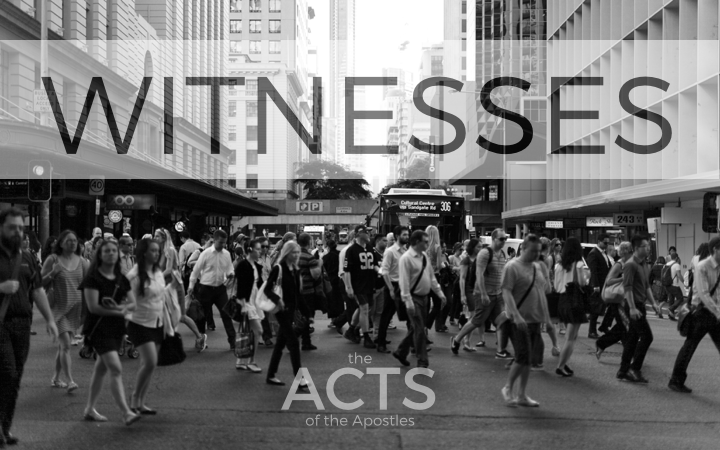
Big Idea:
In the talk on Sunday, because this is such a big passage, the focus is going to be on Acts 4.
Because there’s no one else through whom God is restoring the world, it’d crazy not to talk about him.
Key Verses:
3:15 – You killed the author of life, but God raised him from the dead. We are witnesses of this.
4:12 – Salvation is found in no one else, for there is no other name under heaven given to mankind by which we must be saved.
4:22 – For the man who was miraculously healed was over forty years old.
Structure:
3:1-10 – A cripple from birth is healed.
3:11-26 – But the truly amazing thing is that God sent Jesus to wipe out things and bring restoration.
4:1-22 – So how could we not speak about it?
4:23-30 – It’s the culmination of where God was taking history.
4:31-35 – Community Summary
Observations:
[ut_togglegroup] [ut_toggle title=”3:1-10″] 3:1 – 3pm is the time for afternoon sacrifices.3:2 – This was as close as the beggar could get to God. Being cripple he wasn’t allowed in the inner courts (Lev. 21:17-20; 2 Sam 5:8).
3:8 – As a cripple he would not have been permitted to enter the inner courts. Now, for the first time he could enter and he entered leaping and praising.
[/ut_toggle]
[ut_toggle title=”3:11-26″]
3:11 – Solomon’s colonnade ran the whole length of the eastern side of the Outer Court. This is the place Jesus walked at the feast of the Dedication, perhaps less than a year previously (John 10:23). It became the regular meeting place of the Jerusalem Christians (v.12).
3:21 – This promise of restoration at the return of the Saviour encompasses the whole of creation (see Gen 3:17-19; Rom 8:19-23; 2 Peter 3:13)
3:25 – The quotation is from Genesis 12:3 (See also Gen 18:18; 22:18). The “seed/offspring” here is Jesus, as in the similar quotation in Galatians 3:8. In fact, for a fuller argument of this just read Galatians!
[/ut_toggle]
[ut_toggle title=”4:1-22″]
4:1 – The Saduccees claimed to represent “the ancient standpoint in religion and morals, and emphasised the priestly point of view. The priestly families belonged for the most part to this party, and as the continued enjoyment of the priestly prerogatives and, indeed, the peace of the land and political existence of the people depended on Roman goodwill, they tried to cooperate as far as possible with the Roman authorities, and set their face sternly against religious or nationalistic aspirations which might incur the wrath of the ruling power. They rejected as innovations belief in the world of spirit-beings … and in individual immortality or at least resurrection.” Bruce
4:4 – This is an increase on the 3,000 in 2:14. Throughout the first half of the book of Acts, Luke records the continued dramatic spread of the Gospel.
4:6 – Here’s some fun historical facts for you:
Annas was appointed High Priest by Quirinius in AD 6 and held office until AD 15. “Even after his deposition Annas enjoyed great privilege, and by the time we are dealing with he was the senior ex-High Priest… His prestige is reflected in the NT by his being coupled with Caiaphas in Lk 3:2 as High Priest, and by Jesus’ appearance before him for a private examination before He was led before the Sanhedrin in the place of Caiaphas.”
Caiaphas “was appointed to the High Priesthood by the procurator Valerius Gratus in AD 18, and held it for eighteen years, a longer period than any other High Priest in NT times. The fact that Pilate left him in office during his ten years’ procuratorship suggests that the two had an understanding. As High Priest he would be President of the Sanhedrin, though he may have deferred to the seniority of Annas when the latter was present.”
4:8 – Worth noting that the permanent indwelling of the Holy Spirit is contrasted with special moments of inspiration such as this one (also see 4:31) which is a fulfilment of what Jesus said in Mark 13:11.
4:14 – Note that, as with Jesus, there’s not a denial that this is miraculous, or even that it’s not necessarily from God. They have the proof, but it does nothing to change their mindset.
4:19-20 – In contrast to 4:14, here are unschooled, unlearned men (4:13) who feel they have no choice but to be witnesses to what they have seen. No matter how ridiculous it might sound, or how much they might suffer because of it.
4:22 – Worth noting that 40 isn’t that old. It’s the new 27.
[/ut_toggle]
[ut_toggle title=”4:23-31″]
4:25 – The quotation is from Psalm 2:1. This psalm is interpreted of Jesus in 13:33 and in Hebrews 1:5; 5:5; Revelation 2:27; 12:5; 19:15.
4:31 – The Apostles desire was not to avoid notice, and not to avoid trouble, but to more boldly declare what they had seen and knew to be true. And God granted them that through His Spirit.
[/ut_toggle]
[ut_toggle title=”4:32-35″]
This section serves as both a summary (as in Acts 2:42-47) of the character of the early church, but also as a segue to the next section, which highlights that it wasn’t all smiles and cheers in the early church.
[/ut_toggle]
[/ut_togglegroup]
Application:
Three propositions to consider:
First – No matter the response, we can’t change the message.
If it’s God’s message, we have no right to change it. No matter how culturally unpopular or personally uncomfortable. Discuss!
Second – Know who’s really doing the work.
If it’s God’s message, and God’s mission, then he is able to bring about results independently of me. That doesn’t alleviate me of all responsibility, but it does put “results” out of my hands. Discuss!
Third – The messenger should reflect the message.
Sharing the Gospel with others should be an overflow of the gratitude we have because of what God has done, and a desire for others to know and experience what we have. We want our delivery to reflect the nature of the Gospel – for broken people, who’ve been forgiven & adopted, by a loving & gracious God.





